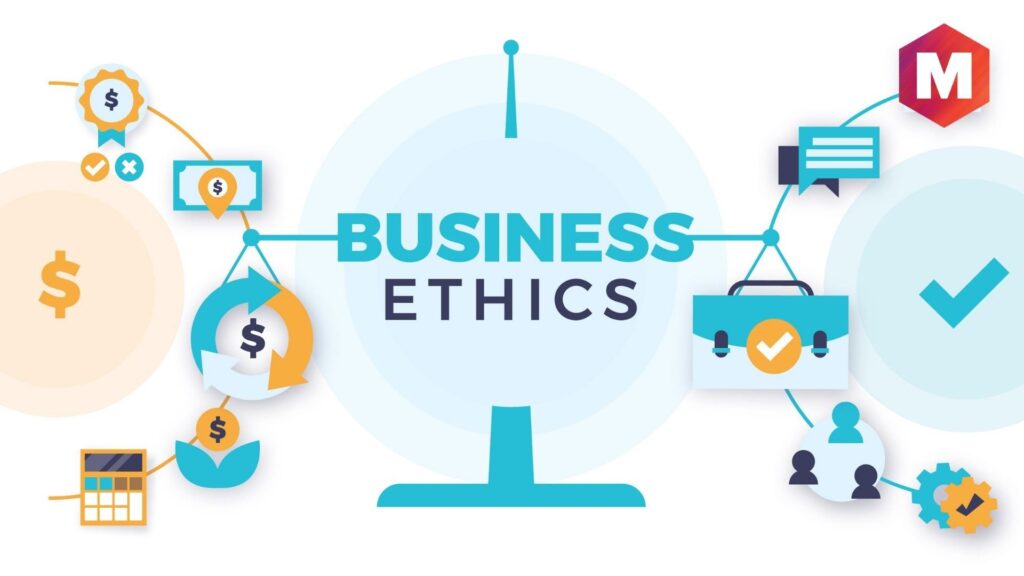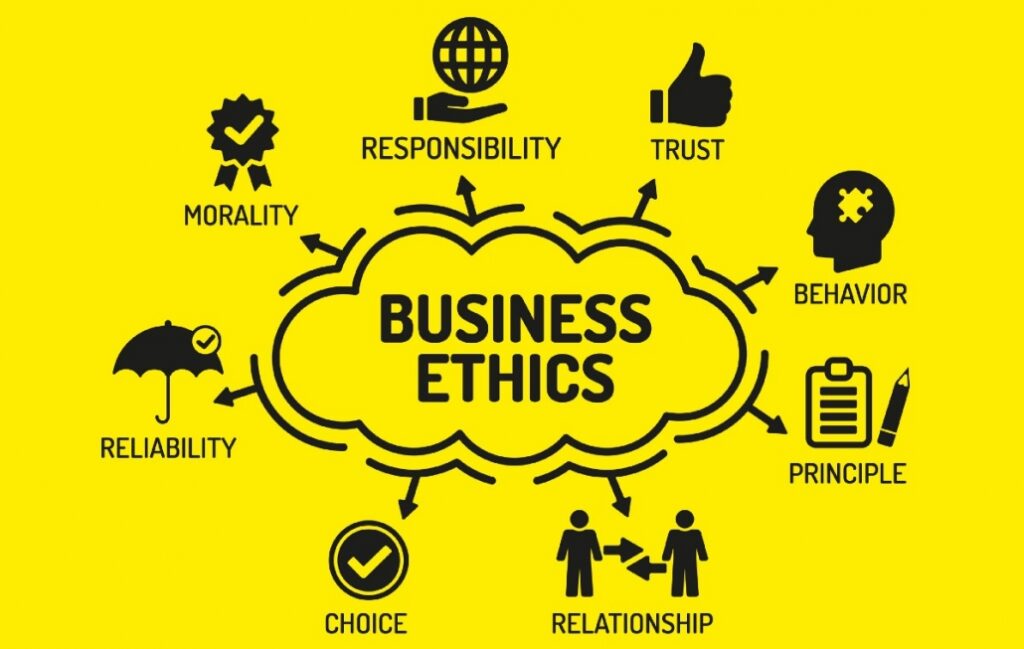
Table of Contents
Introduction
Business ethics is concerned with how a businessman conducts himself when doing business. Businessmen and company units are having issues as a result of unethical conduct. The ethics a businessman practises determines the longevity and expansion of a company unit.
Business ethics are formed through time and by tradition. From one kind of company to another, a custom varies. A tradition will turn into an ethic if it is followed and embraced by businesspeople and the general public.
Company ethics are not only relevant to one form of business, but to all types of businesses. Business ethics must be followed in order for businesses to fulfil their societal responsibilities. While assuming social duty, a businessperson should not disregard business ethics.
Meaning of Ethics
The term “ethics” comes from the Greek word “ethos,” which means “character.” Ethics in literature refers to a system of values or morals. A work’s performance develops an ethic as a consequence of adopting morals.
Definition of Ethics
According to P.W. Wright, “Ethics is that area of philosophy which is the systematic study of reflective decision, of the moral principles by which it is to be judged, and of the ends it may eventually be directed.”
Ethics is “the discipline dealing with that which is good and wrong as well as with moral responsibility and obligation,” according to Webster.
Hurley clarifies,”as a set of moral rules known as ethics.”
Meaning of Business Ethics
Business ethics refers to a businessperson’s behaviour while running a firm and upholding morals throughout.
Businessmen’s actions have a greater influence within the company than they do outside. Therefore, even if he may feel that the laws are unfair or immoral, he should nonetheless observe them. Instead of breaking the law, a businessman who believes that the laws’ provisions are unfair might take action to amend the laws.
A businessman should uphold moral principles both in his professional and personal life. In order to avoid punishment, such morality is not essential to be observed. He should follow moral principles motivated by his personal concern for his company and society at large.
The separation between a businessman and his company does not exist. There is no distinct corporate ethics, in Drucker’s view, and everyone in society should adhere to certain moral principles.
Check here for latest case studies and research book : https://kit.co/Anurooba/case-analysis-text-books
Definition of Business Ethics
No one has a unified definition of what business ethics are? Distinguished writers each describe business ethics differently. The following list includes some key definitions of business ethics:
According to Wheeler, “business ethics is an art and science for sustaining, harmonious interaction with society, its many groups, and institutions as well as reorganising the moral responsibility for the rightness or wrongness of company activity.””
Company ethics, according to T.M. Garret, “is principally concerned with the link of business aims and practises to particularly human purposes.” A collection of moral guidelines and principles that serve to safeguard the interests of clients, staff members, society, individual company units, and the sector as a whole may be referred to as business ethics.
Need for Business Ethics
A businessman’s lifestyle is impacted by the growth of his company. A businessman’s lifestyle and behaviour are closely related. Consequently, adhering to corporate ethics is essential for the following reasons:
1) The ability of the business unit to survive: Businessmen should take this into account. The termination of a company unit will result from unethical business activities. The loss of a business unit not only affects the corporation, but also the workers and society at large. Typically, poor behaviour is penalised and good behaviour is rewarded.
A company seeks to maximise profits since it is an economic entity. Businessmen do not prioritise profit maximisation above maintaining a company unit. Some elements, like as leadership abilities, honesty, expertise, skills, influence, and the use of power, have an impact on how a businessman behaves. Businessmen are obliged to take every precaution to preserve their assets.
2) Business unit development: Ensuring business growth is the second benefit of adhering to business ethics. The specific company unit will undoubtedly flourish when a businessman upholds ethics severely. A company could not be operated in a way that is harmful to society’s or the business’s own interests. Therefore, it is said that business ethics are necessary for a company to flourish.
3) Building goodwill: Profit is always the main goal of every firm. However, no company is permitted to make a profit without upholding ethical standards. A company unit naturally gains a positive reputation in the eyes of the public if business ethics are correctly maintained by that firm.
4) Increasing confidence: In order to increase the confidence of clients, staff members, and others, business ethics are required. The name or good customer services of the specific business unit will become more well-known if trust is instilled in them (customers and staff). For instance, by praising its virtues and criticising its shortcomings.
5) Maintaining Inter-Relationship: Upholding No firm operates alone or independently; instead, everything is interrelated. Despite the fact that the other business’s nature and size are different, each one has tight ties to the other. The saying “No tree can be regarded as a forest, as the saying goes. Each business unit should get along well with the others, it is anticipated. Adopting corporate ethics preserves the interdependence of business.
6) Resolving social issues: If a businessperson conducts himself ethically, the public will not have any trouble getting what they want. Between the merchant and the general public, there is no haggling. He treats his staff with fairness. Social issues like strikes, lockouts, etc. will be avoided as a result.
Principles of Business Ethics

Some of the fundamental rules of business ethics are listed here. Here is a quick explanation of them:
- Despite the fact that the primary goal of every organisation is to make money, the service motivation should come first.
- No group of individuals, such as the wealthy, the poor, the high and the low, the caste, the religion, etc., is discriminated against.
- Customers should be able to fully satisfy their needs.
- Environmental protection is taken into account.
- When providing service, human sentiments are appropriately taken into account.
- No resources, which are precious and limited, are wasted or misused.
- A business must be effective and dynamic.
- Companies should provide high-quality goods at fair prices.
- The level of life must be maintained or elevated through business.
- Healthy competition is necessary.
- Employees don’t worry about their job security. In other words, workers should have a secure employment.
- Businessmen should be honest while paying appropriate compensation.
- The environment or working circumstances should be improved.
- Effective workers get the necessary motivation and praise.
- Employee involvement in management is encouraged.
- Employees must be allowed to choose between monetary and non-monetary incentives.
- Businessmen are required to pay taxes on time and fulfil other duties on time.
- Business units must refrain from unethical marketing techniques such as hoarding.
- No cartel agreements should be created to restrict production, prices, etc.
- Businessmen must provide all pertinent information to those in need.
- Businessmen are obligated to create authentic books of accounts and deliver them to all authorised parties when requested to do so.
- He shall defend their members’ interests during mergers, acquisitions, and other similar events.
- He should be prepared to provide assistance and cooperation to others.
- Business need to participate in the growth of the country.
- He need to adhere to appropriate communication protocols at all levels.
- He shouldn’t make unfulfillable promises.
- Neither the business’s owner nor any of its workers should use company property for private purposes.
- Free expression is permitted in the workplace.
- Business units should adhere to suitable personnel policies on transfers, promotions, and other matters.
- Businessmen should avoid becoming involved in politics.
Regulations of Business Ethics
A businessman adheres to business ethics because of the repercussions of their noncompliance. A few of the rules are briefly mentioned here:
1)Legal requirements: Enforcing legal requirements is one technique to force businesspeople to uphold ethical standards. Enforcing the laws serves to safeguard the public’s interests, including those of corporations and businesspeople. Among the legislative measures are the Company’s Act, Consumer Protection Act, M.R.T.P. Act, and others.
2) Business unit’s reputation: In general, businesspeople must put in a lot of effort to establish a reputation for upholding ethical standards. To retain the gained goodwill, the same procedure is then used.
3) A businessman’s social standing: A businessman believes that he is recognised by the community where he does business. It is always moral for a businessperson to maintain their social standing. He therefore wants to maintain his social position while abstaining from unfair or unethical commercial practises.
4) Trade unions: India is home to several active unions. There are two types of trade unions: registered and unregistered. If business ethics are not properly upheld in this case, the trade union will be penalised. A trade union serves as a watchdog to guarantee that company ethics are upheld.
5) Business association: An outside organisation like the business association advises businesses on how to uphold business ethics and explains why they should. If a company unit violates ethics, the business association may exclude the offending business unit.
6) Consumer movement: To preserve consumer interests, the consumer movement has greatly evolved in recent years. In actuality, business ethics is concerned with morality in the workplace. However, consumer movements actively contribute to the acceptance of corporate ethics.
For instance, the consumer movement demands the business unit maintain the quality as described by it if a product bought does not meet the standards as provided and files a claim for damages or takes action to replace the goods for the customer.
Factors affecting Business Ethics
Business ethics demonstrate its accountability, power, and dignity. As a result, the business organisation seeks to conduct its operations in a way that protects both the interests of society and the firm itself. It does this by taking ownership, exerting power, and upholding its dignity. However, there are various elements that influence the observance or application of corporate ethics. Below is a quick explanation of them:
- Unhealthy competition: To gain an advantage over other businesses, businesspeople engage in unethical business tactics. Long-term, this will harm company. Gentlemen businessmen do not like unhealthy rivalry.
- Unusual profit motive: Making money is the main driver behind launching a firm. In the beginning of a company, just a little quantity of profit is made. The businessman, though, hopes to increase revenues by cutting down on operating costs.
- Political meddling: Political organisations contact businesspeople to solicit donations. Currently, the businessman is not prepared to reject it since doing so would interfere with operations. From a corporate perspective, the gift made to a political party is seen as an unnecessary cost. This will have an impact on revenue and efficient operations.
- Political unpredictability: Government policies have an impact on corporate ethics to some degree. There is a good possibility that the government’s policies will shift if many governments hold power for brief periods. Only a stable government cannot change a company’s ethical standards.
- Unfair legislation: Only after much debate is a law enacted. However, the participant in the debate has no prior business experience and is unaware of the realities of everyday life. Thus, an action that is morally correct may not be legally correct.
- Corruption: The government regulates business via its representatives. The government agencies employ honest and competent employees. The businesspeople, however, do not enjoy certain government officials’ methods or behaviours.
- A lack of an ethical mindset: A businessman seeks to differentiate himself from other businesspeople. Despite his thorough understanding of corporate ethics, he nonetheless prefers not to put them into effect.
- Lack of education: In this context, education refers to the mastery of moral principles. A businessman wishes to adhere to business ethics scrupulously, but he is unsure of the business ethics that apply to his industry.
- Lack of cooperation on the part of employees: Employees don’t care about business ethics. They just want to do their task as soon as they can in exchange for payment. Non-adoption of business ethics has an impact on the company, not the workers or employees.
- Red tape: Red tape influences corporate ethics in addition to being present. Government approval is required in advance for every action a business unit takes at every level of growth. Red tape is observed to be most prevalent in the taxation policy and the issuance of permits.
A BEST WAY TO EARN WHILE YOU STUDY, JOIN THIS APP UPLOAD PHOTOS, SAVE MONEY FROM NOW ON : https://bit.ly/3g7PxAg
Benefits of Business Ethics

A firm may operate in accordance with certain accepted business ethics. If, then the impacted groups may profit from the following advantages. The advantages of business ethics are grouped as follows:
- Clients / Customers
- Get high-quality products.
- Make a fair purchase.
- Getting products is not tough.
- No preference based on pricing.
- No change in pricing.
- Personnel / Employees
- Just pay.
- Improved working conditions and surroundings.
- Spotting human emotions.
- Reward effectiveness.
- Job stability
- Involvement in management.
- Adequate personnel policies.
- Business / Industry
- Healthy rivalry.
- Improved coordination and cooperation.
- Consistent growth.
- Industry
- Adequate Profit.
- Rapid expansion
- Quick business diversification
- Lower employee turnover.
5. Society
- More efficient use of resources.
- Raising living standards.
- No issue with pollution.
6. Government
- Timely tax collection.
- development of the country.
- Simple application of laws.
Business Ethics in India
The majority of businesspeople in India adhere to high ethical standards. They are aware of their obligations to different societal groups. However, they have trouble putting corporate ethics into practise. The business environment changes constantly, which is the cause. At whatever cost, businessmen are prepared to adapt to changing business principles by offering
Many businesses want to use shortcuts to generate big profits. Focus costs are included into the books of accounts in order to reflect less profit and avoid paying taxes. In order to reduce taxes, products are then invoiced at a reduced rate.
Only after raising the actual selling price is a reduction in price proclaimed. Different categories of individuals, such as recognised and unknown, educated and illiterate, wealthy and poor, men and women, and the like, are subject to price discrimination.
Entrepreneurs are unwilling to pay even the minimal wage. Businessmen do not take their workers’ health into account and are unwilling to cover necessary medical costs. In certain circumstances, businessmen’s medical costs are taken out of their pay.
Businessmen get employee acknowledgment for a bigger sum than they have really paid. Without the enthusiastic support of businesspeople, no one will be able to regulate this kind of activity. Only businesspeople are capable of observing business ethics.